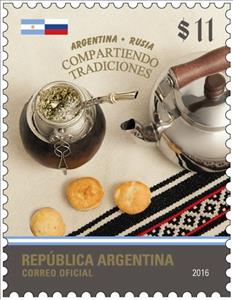Stamp: Mate (Argentina 2016)
Mate (Argentina 2016)
14 November (Argentina ) within release Shearing Traditions - Argentina~Russia Joint Issue goes into circulation Stamp Mate face value 11 Argentine peso
| Stamp Mate in catalogues | |
|---|---|
| Gz (Cefiloza): | Gz: AR 3507 |
Stamp is vertical format.
Stamp Mate it reflects the thematic directions:
A drink or beverage is a liquid intended for human consumption. In addition to their basic function of satisfying thirst, drinks play important roles in human culture. Common types of drinks include plain drinking water, milk, juice, smoothies and soft drinks. Traditionally warm beverages include coffee, tea, and hot chocolate. Caffeinated drinks that contain the stimulant caffeine have a long history.
Food is any substance consumed by an organism for nutritional support. Food is usually of plant, animal, or fungal origin and contains essential nutrients such as carbohydrates, fats, proteins, vitamins, or minerals. The substance is ingested by an organism and assimilated by the organism's cells to provide energy, maintain life, or stimulate growth. Different species of animals have different feeding behaviours that satisfy the needs of their metabolisms and have evolved to fill a specific ecological niche within specific geographical contexts.
A joint issue is the release of stamps or postal stationery by two or more countries to commemorate the same topic, event or person. Joint issues typically have the same first day of issue and their design is often similar or identical, except for the identification of country and value.A tradition is a system of beliefs or behaviors (folk custom) passed down within a group of people or society with symbolic meaning or special significance with origins in the past. A component of cultural expressions and folklore, common examples include holidays or impractical but socially meaningful clothes (like lawyers' wigs or military officers' spurs), but the idea has also been applied to social norms and behaviors such as greetings, etc. Traditions can persist and evolve for thousands of years— the word tradition itself derives from the Latin word tradere literally meaning to transmit, to hand over, to give for safekeeping. While it is reportedly assumed that traditions have an ancient history, many traditions have been invented on purpose, whether it be political or cultural, over short periods of time. Various academic disciplines also use the word in a variety of ways.




